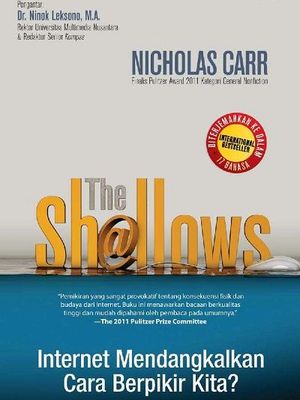

We might be consigned to the intellectual shallows, but these shallows are as wide as a vast ocean., The Shallows isn't McLuhan's Understanding Media, but the curiosity rather than trepidation with which Carr reports on the effects of online culture pulls him well into line with his predecessor. Even as Carr bemoans his vanishing attention span, he's careful to note the usefulness of the Internet, which provides us with access to a near infinitude of information. What emerges for the reader, inexorably, is the suspicion that we have well and truly screwed ourselves., This is a measured manifesto. In doing so, he gently refutes the ideologists of progress, and shows what is really at stake in the daily habits of our wired lives: the re-constitution of our minds. Nicholas Carr does a wonderful job synthesizing the recent cognitive research. Welcome to the shallows, where the un-educating of homo sapiens begins. The fruits of this capacity we call civilization. Witty, ambitious, and immensely readable, The Shallows actually manages to describe the weird, new, artificial world in which we now live., The core of education is this: developing the capacity to concentrate. Without ever losing sight of the larger questions at stake, he calmly demolishes the clichés that have dominated discussions about the Internet. Mild-mannered, never polemical, with nothing of the Luddite about him, Carr makes his points with a lot of apt citations and wide-ranging erudition., This is a lovely story well told-an ode to a quieter, less frenetic time when reading was more than skimming and thought was more than mere recitation., Nicholas Carr carefully examines the most important topic in contemporary culture-the mental and social transformation created by our new electronic environment.

It is a patient and rewarding popularization of some of the research being done at the frontiers of brain science. Highly recommended., The subtitle of Nicholas Carr's The Shallows: What the Internet is Doing to Our Brains leads one to expect a polemic in the tradition of those published in the 1950s about how rock 'n' roll was corrupting the nation's youth. His fantastic investigation of the effect of the Internet on our neurological selves concludes with a very humanistic petition for balancing our human and computer interactions.

Carr's analysis incorporates a wealth of neuroscience and other research, as well as philosophy, science, history and cultural developments.

Carr provides a deep, enlightening examination of how the Internet influences the brain and its neural pathways.


 0 kommentar(er)
0 kommentar(er)
